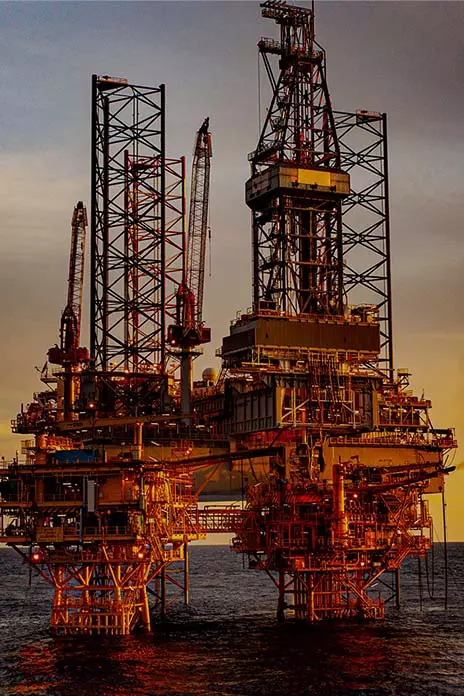Texas residents are all too familiar with oil rigs and offshore drilling, as Texas is one of the largest suppliers of oil and natural gas. Because of this, there are countless offshore oil rig jobs and oil and natural gas employees in the state.
Unfortunately, this industry is one of the riskiest for employees. Offshore oil rig accidents can result in catastrophic injuries and even death. While some dangerous incidents cannot be avoided, it’s helpful to understand some of the most common causes of offshore drilling accidents.
Fume Clouds and Chemical Exposure
As an oil and gas worker, you’ll be exposed to several dangerous chemicals. Some of the chemicals that you may find on offshore drilling sites include:
- Hydrogen sulfide
- Sulfur dioxide
- Asbestos
- Nitrogen oxide
- Benzene
- Silica
Chemical exposure can result in a wide variety of injuries and medical issues, depending on the substance you come in contact with. The fumes of certain chemicals can irritate your eyes, and breathing it in can cause internal injury and discomfort.
Contact with chemicals can cause severe burns that may result in scarring and disfigurement. Repeated exposure to certain chemicals can also lead to long-term consequences, including certain cancers and paralysis.
Oil Rig Fires or Explosions
Gas and oil are highly flammable, making fires and explosions a common hazard of the job. When an explosion occurs, or a fire starts, it can be particularly difficult to put it out. For this reason, workers are at risk of suffering life-threatening injuries, including serious burns, requiring extensive medical care.
Falls
Falls can happen at any job, but more specifically at jobs that require manual labor and working from heights like oil rigs. Over one million injuries at work were related to falls.
When working on an offshore oil rig, your employer should always provide sufficient fall protection and safety gear. Not having adequate tools, lack of training and experience, and negligent behavior can all cause falls, resulting in serious harm. Common offshore drilling injuries from falls on oil rigs include injuries to the brain and spinal cord.
Transportation or Hauling Accidents
The oil and gas industry relies on several modes of transportation, including watercraft, planes, helicopters, and motor vehicles. Transportation accidents happen frequently for various reasons, from operator negligence to inclement weather.
Well Blowouts
A well blowout is an uncontrollable flow of crude oil and natural gas. Modern wells feature blowout preventers to avoid such occurrences, but they can still happen under certain circumstances.
A well blowout, also called a “gusher,” happens most often when the pressure balance of the well is not adequately maintained or the pressure release system fails. A blowout can cause substantial, even fatal, injuries.
Frequently Asked Questions
Some of the causes of offshore drilling accidents are out of employees’ control, while others are caused by negligent actions or omissions.
Here are some of the most commonly asked questions about offshore drilling injuries.
How Do Offshore Drilling Accidents Happen?
On an offshore drilling site, many things are likely to go wrong at any given moment. Accidents can happen for several different reasons, including, but not limited to:
- Lack of proper training or experience
- Dangerous, negligent behaviors
- Insufficient safety gear and equipment
- Equipment malfunctions and failures
- Extreme weather
- Unsecured machinery
- Inadequate equipment maintenance
- Collapsing rigs
Unfortunately, on an offshore oil rig, one simple mistake can result in life-altering injuries and even death.
How Can I Pursue Compensation for My Offshore Drilling Injuries?
An injury attorney can review the specifics of your case to determine the best way to pursue compensation on your behalf. Certain laws protect injured workers, allowing you to seek financial recovery for your job-related injuries. These include:
- Texas Workers’ Compensation Act: Provides compensation and benefits to covered employees for work-related accidents and injuries
- The Longshore and Harbor Workers' Compensation Act: Provides financial relief and benefits to employees disabled from job-related injuries that occurred on the navigable water of the United States
- The Oil and Pollution Act: Dictates the compensation process for injuries an individual sustains caused by a spill or other rig catastrophe
Additionally, if a loved one has died in an offshore drilling accident, Texas wrongful death laws apply. The Jones Act or the Death on the High Seas Act may also apply, depending on the situation.
The Jones Act provides compensation to a qualified offshore worker’s surviving spouse or children. The Death on the High Seas Act offers financial relief for families of workers who passed away more than three miles outside territorial waters.
Pursuing compensation after you’ve suffered injuries or lost a loved one in an offshore drilling accident can be overwhelming and confusing. An injury attorney can provide proper guidance and protect your rights to fair financial recovery.
When Should I Contact a Lawyer After Suffering Injuries in an Offshore Drilling Incident?
After sustaining injuries on an offshore oil rig, your health and well-being should always come first. Once you’ve sought suitable treatment, schedule a consultation with an injury attorney.
Time restrictions limit your chance to take action and seek monetary recovery. The sooner you speak with a lawyer, the quicker they can begin working on your case.
After Sustaining Injuries in an Offshore Drilling Accident, Contact Dunn Sheehan
An offshore drilling accident can change your life for the worse. While money cannot fix all your problems, it can significantly help relieve the heavy burdens you’ll likely face after an oil rig accident.
The legal team at Dunn Sheehan is here for you. As a trial firm with extensive experience handling catastrophic injury cases, we can fight aggressively to help secure the compensation you need and deserve after suffering unfortunate physical harm and other losses. Contact us today to get started.

